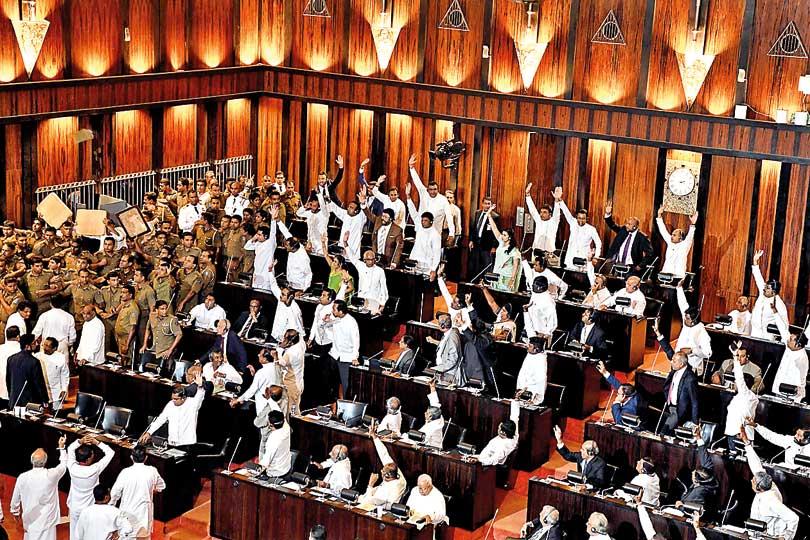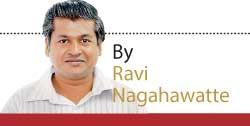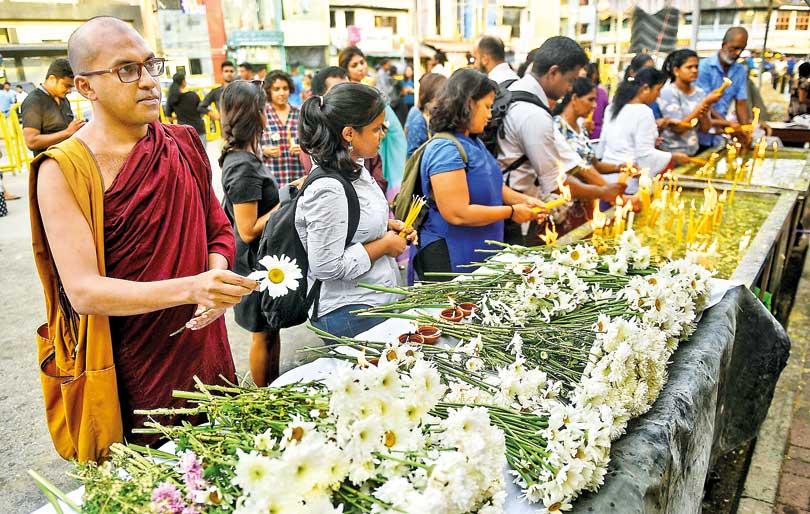Reply To:
Name - Reply Comment

Police officials gather to escort Speaker Karu Jayasuriya following a commotion in parliament (AFP)
 Politically it was a happening year for Sri Lanka with political bunglings by the Yahapalana regime ending up with a regime change just before the dawn of another year.
Politically it was a happening year for Sri Lanka with political bunglings by the Yahapalana regime ending up with a regime change just before the dawn of another year.
On paper the UNP led alliance promised much and voters fell for the carrots that seasoned lawmaker Ranil Wickremesinghe hung in their presence. People expected the nation to prosper like during past UNP led regimes, but the key figures in the Wickremesinghe ‘clique’ never took to the tasks assigned to them with any seriousness. One good example was appointing Hemasiri Fernando as the Defense Secretary. The result was the weakening of national security which made it quite easy for an extremist organisation to trigger off a series of bombs in the island on Easter Sunday.
Questions are also raised about Wickremesinghe’s choice of Arjuna Mahendran as Central Bank Governor. The alleged Central Bank bond scam shook a nation and caused cracks in the Government establishment. People who voted for a change and wanted to see accountability and transparency saw that the Yahapalana regime was in a way travelling on the same path as the Rajapkasa led regime which was thrown out in 2015. As all these terrible stories unfolded, voters-regardless of cast, religion and political party- began to question as to what past government officials had done to the tax payers monies during the past 71 years?
Sri Lankans saw the 71st Independence Day celebrations and the marking of 10 years after the tiger rebels were vanquished being celebrated with all the pomp and pageantry. The Government signed deals with China, India and USA largely for development work; some of it coming up in war-torn areas in the north. The buildings being constructed indicated that the island’s administration was looking to the future, but little did they realise that the citizens they were taking along in the bandwagon also had among them suffering from mental wounds.
These shortcomings on the part of the Government often get highlighted when the Geneva sessions of the UNHRC are on. This year too in March Sri Lanka were left being uncomfortable when the Government decided not to send a deligation for the sessions and asked the Permanent Representative to the United Nations office in Geneva Ambassador ALA Azeez to handle the proceedings with his team. This was largely because Sri Lanka co-sponsored a resolution against its own nation in 2017 to play for time. This was to fulfill terms in a resolution moved against the island in terms of implementing conditions relating to Human Rights, Accountability and reconciliation.
When it came to administrating matters relating to our Human Rights record, the willingness showed by Wickremesinghe to discuss matters with the world authorities was met with disapproval by the country’s President Maithripala Sirisena. In general Sri Lanka was very uncomfortable throughout this year whenever discussions arose at the world stage regarding accountability and the concluding of the civil war in the island.
Overall Sri Lanka was divided on key issues whether it was the controversial Dr. Shafi’s case or what happened after the Easter Bombings. The Sinhalese hardliners were up in arms over the case which featured Dr.Shafi. Despite the CID concluding that there wasn’t sufficient evidence to prove the allegations against the doctor extremist elements demanded for the doctor’s ‘head’. In the issue regarding the Easter Sunday bombings again the majority hardliners were successful when initiating a boycott of Muslim owned establishments. This was despite it being clear that the attacks were carried out by an extremists group which knew very little about the Islam faith. For the record the representatives of these terrorist group were disowned by their own Muslim community. After the dust settled following the carnage and the Presidential Election results were announced there were attempts made by certain unscrupulous individuals to point fingers at the Christian community for voting for a candidate who was backed by Muslims. Racial tensions often surfaced this year and attempts behind moves to ignite fire among communities often had a political hand in them.

A Sri Lankan Buddhist monk (L) takes part in a remembrance ceremony in front of St. Anthony’s Church in Colombo on May 21, 2019 (AFP)
In whatever we did there was a tussle between the good and the bad. One example for this was how democracy prevailed during a 52-day government which was given birth due to an initiative taken by President Sirisena. This new Cabinet was formed after Sirisena unceremoniously sacked his Prime Minister for not seeing eye to eye with him. Largely due to the efforts of Speaker Karu Jayasuriya and the Supreme Court ruling given on the grounds that the dissolving of Parliament before 4 1/2 years concluded was unconstitutional, a constitutional crisis was settled. This was done in the nick of time before Sri Lanka would have been internationally isolated.
Wickremesinghe being reinstated as Premier and an eventual fully fledged UNP regime taking over the reins of the country could be termed as the greatest achievement of the ‘Green Man’ who has stayed afloat in politics thanks to several lifelines he received throughout his career as a lawmaker.
But people with impatience and short memories rejected the package offered by the Wickremesinghe regime which promoted democracy and freedom of speech to a very high degree. If what the Government offered was best described as ‘good’ its adversaries marshaled by an opposition force- led by the Pohottuwa Party- promoted a political ideology that promised to deliver even if there were doubts about whether its implementing would be done in a decent and accepted manner. People voted for a military styled ruler in Gotabaya Rajapaksa instead of a seasoned campaigner like Sajith Premadasa who boasts of a comprehensive profile highlighting a long political track record.
Already the government is on a witch-hunt trying to silence earmarked CID and Police officials. Several proposals have been presented on paper and people are asking the question as to how the regime faced with the challenge of clearing a massive debt commitment would raise finances for them.
As the days just tick away till the new year dawns the ambitious will count their fingers while the right-thinking ones who’ll not compromise on honesty and promote fair-play would keep their fingers crossed.